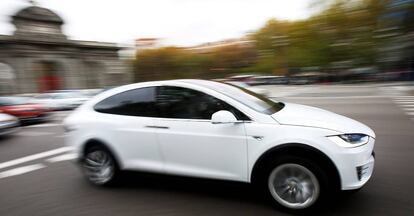Tesla electric cars: soon to be seen on Spanish roads
Pioneer now working on network of superchargers to allow long-distance driving
Spain today joins a relatively exclusive list of 22 countries where it is possible to buy a Tesla electric car. Through the company’s website – it says it plans to open showrooms next year in Madrid and Barcelona – it will be possible to arrange a test drive and order an upscale Model X, starting at €103,000, along with the more economically priced Model S, which comes in at €80,100, with delivery taking around three months.

Aside from the price tag, the main obstacle to getting a Tesla on the road in Spain is the absence of any kind of nationwide network to recharge the vehicles’ batteries: the company has just seven of its own superchargers in Spain, based along the country’s Mediterranean corridor, and that can charge 50% of the battery in 20 minutes, free of charge. “We’ve started working on expanding the network between Madrid and Barcelona,” says Jorge Milburn, the head of Tesla in Spain.
The company is also working with some 50 hotels and other locations to install chargers, explains Milburn, adding: “But these are really only meant for people undertaking long journeys, because 95% of charging can be done at home or the office.” The downside of not using a Tesla supercharger is that it takes around eight hours to store enough power to cover 150 kilometers.
The $35,000 Tesla Model 3 will not be available in Spain until 2018
“Our goal is to show that there are no limits,” says Milburn. “We have 250 superchargers in Europe. You can travel from the north of Norway to the south of Spain in your electric car.”
Tesla has also incorporated self-driving features into the models that will be on sale in Spain, says Milburn. “This is now legal in Spain, but the driver must always be in control of the vehicle: it’s assisted driving, not autonomous.”
During a test drive on Madrid’s M-30 ring road, the Model X accelerates and slows down on its own, and will change lane when the driver activates the indicator, keeping within the speed limit and at a safe distance from the car in front, an experience that offers a glimpse of a not-too distant future of self-driving cars.
But back in the city, it’s a different story: the car’s sensors cannot detect worn-out lane markings and it is unable to “read” the city’s traffic lights, so the vehicle switches off the self-drive feature.
Tesla has incorporated self-driving features into the models that will be on sale in Spain
“We believe that the future is self-driving, but we need more experience,” explains Willem Haitnik, Tesla’s Vice-President for Europe, Africa and the Middle East. “We have the hardware, and all our cars now have eight cameras that can record 360 degrees and up to 250 meters, with radar, sensors and an incredible computer on board that analyses data in real time.”
Tesla says that far from fearing competition, it welcomes the entry of other companies into the electric car market: “We see a future in which all cars are electric and largely self-driving,” says Haitnik. “Competition means that other companies are following our example and that we are helping speed up the transition toward sustainable mobility, which is our real goal.”
This approach was laid out by Elon Musk, Tesla’s founder and CEO: that the idea was not to create the best electric sports car, but to use the money from the sales of a luxury car to fund the creation of a lower-priced electric vehicle.This will be the Model 3, with a $35,000 price tag, but which will not be available in Spain until 2018.
English version by Nick Lyne.
Tu suscripción se está usando en otro dispositivo
¿Quieres añadir otro usuario a tu suscripción?
Si continúas leyendo en este dispositivo, no se podrá leer en el otro.
FlechaTu suscripción se está usando en otro dispositivo y solo puedes acceder a EL PAÍS desde un dispositivo a la vez.
Si quieres compartir tu cuenta, cambia tu suscripción a la modalidad Premium, así podrás añadir otro usuario. Cada uno accederá con su propia cuenta de email, lo que os permitirá personalizar vuestra experiencia en EL PAÍS.
¿Tienes una suscripción de empresa? Accede aquí para contratar más cuentas.
En el caso de no saber quién está usando tu cuenta, te recomendamos cambiar tu contraseña aquí.
Si decides continuar compartiendo tu cuenta, este mensaje se mostrará en tu dispositivo y en el de la otra persona que está usando tu cuenta de forma indefinida, afectando a tu experiencia de lectura. Puedes consultar aquí los términos y condiciones de la suscripción digital.









































